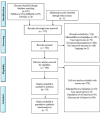Correct dosing, adherence and persistence of DOACs in atrial fibrillation and chronic kidney disease: a systematic review and meta-analysis
- PMID: 37419525
- PMCID: PMC10347456
- DOI: 10.1136/openhrt-2023-002340
Correct dosing, adherence and persistence of DOACs in atrial fibrillation and chronic kidney disease: a systematic review and meta-analysis
Abstract
Background: Chronic kidney disease (CKD) and atrial fibrillation (AF) are increasing in prevalence globally and share common risk factors.Our aim was to characterise real-world evidence on direct oral anticoagulant (DOAC) prescribing for people with AF and CKD, in terms of adherence, persistence and renal dose titration.
Methods: PubMed, EMBASE and CINAHL were searched from inception to June 2022. Our search terms included a combination of Medical Subject Headings (MeSH) terms and keywords including 'atrial fibrillation', 'chronic kidney disease', 'adherence', 'persistence', 'direct oral anticoagulants' and 'dosing'. Data extraction and quality assessment were undertaken by two reviewers independently. Meta-analyses for pooled estimates were performed using DerSimonian and Laird random-effects models. Age, sex, diabetes, hypertension and heart failure were chosen as variables of interest.
Results: From 19 studies, a total of 252 117 patients were included with CKD and AF. Meta-analysis was only possible in seven studies with 128 406 patients, five on DOAC dose titration and two on adherence. There were insufficient studies on persistence. Our meta-analysis of dosing showed that 68% of patients with CKD and AF had correct dosing. There was no evidence to show any association between correct DOAC dosing and variables of interest. Overall, 67% of patients were DOAC adherent.
Conclusion: Adherence and correct dosing of DOACs were suboptimal compared with other medications in the pooled studies with respect to CKD and AF. Thus, further research is required as the lack of generalisation of findings is a rate-limiting factor for improved DOAC management in AF and CKD.
Prospero registration number: CRD;42022344491.
Keywords: atrial fibrillation; drug monitoring; medication adherence; meta-analysis; systematic reviews as topic.
© Author(s) (or their employer(s)) 2023. Re-use permitted under CC BY-NC. No commercial re-use. See rights and permissions. Published by BMJ.
Conflict of interest statement
Competing interests: None declared.
Figures








References
-
- Vora P, Morgan Stewart H, Russell B, et al. . Time trends and treatment pathways in prescribing individual oral anticoagulants in patients with nonvalvular atrial fibrillation: an observational study of more than three million patients from Europe and the United States. Int J Clin Pract 2022;2022:6707985. 10.1155/2022/6707985 - DOI - PMC - PubMed
-
- NICE . Atrial fibrillation: diagnosis and management. 2021. Available: https://www.nice.org.uk/guidance/ng196
Publication types
MeSH terms
Substances
LinkOut - more resources
Full Text Sources
Medical
